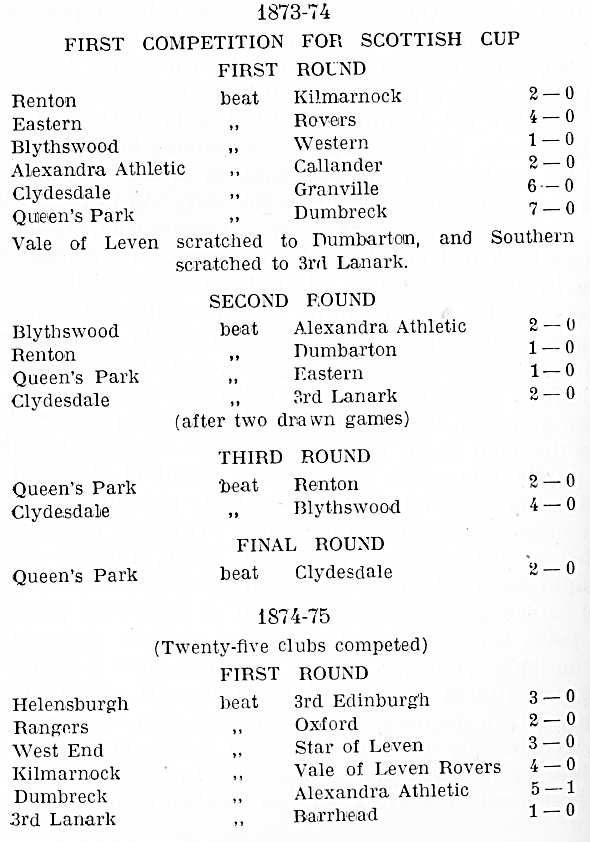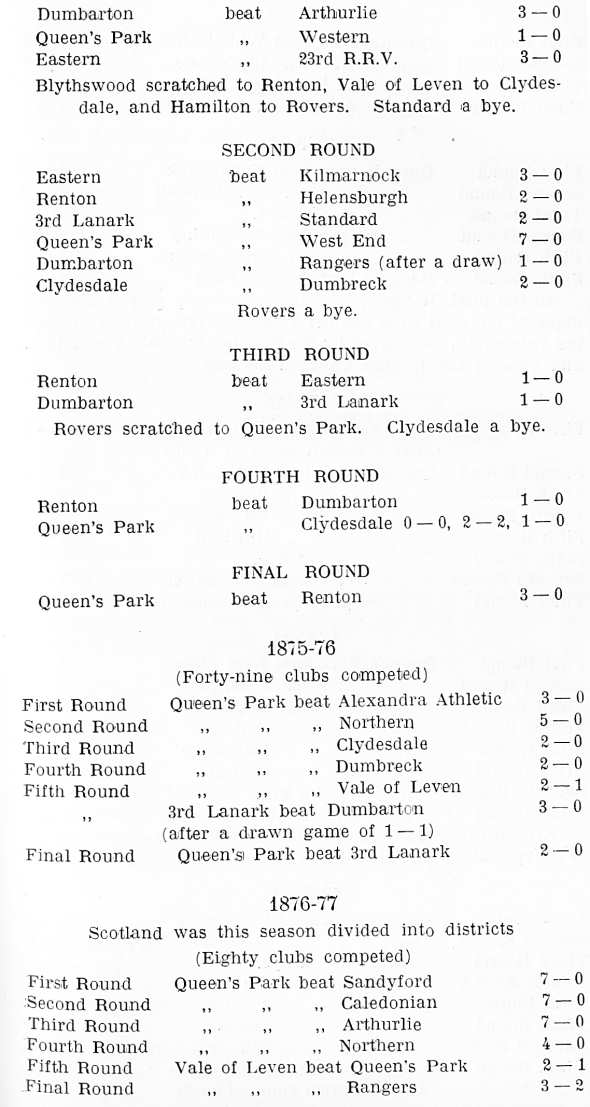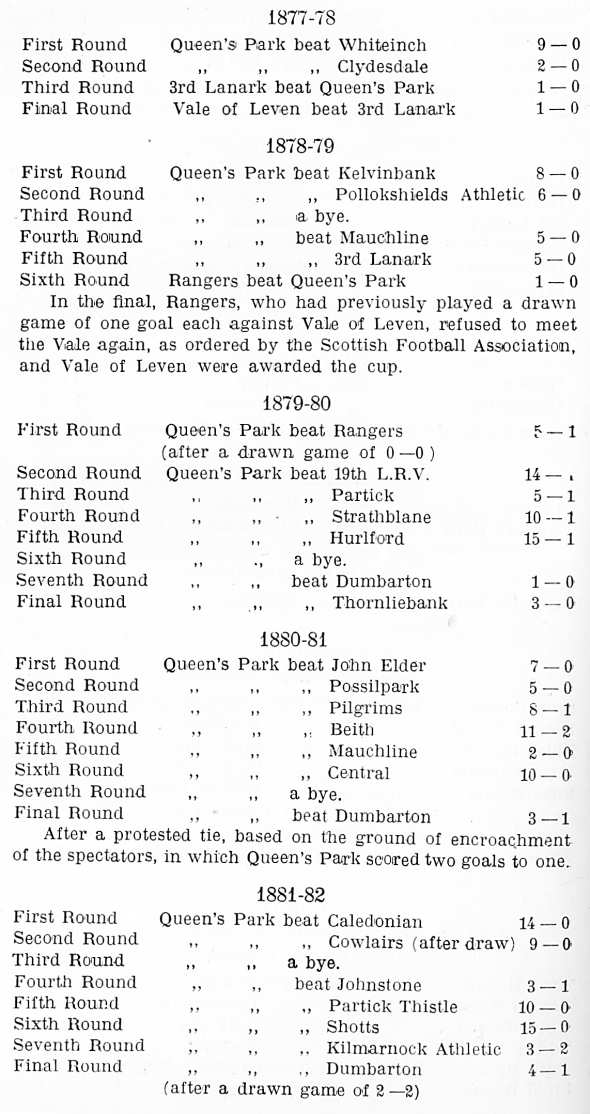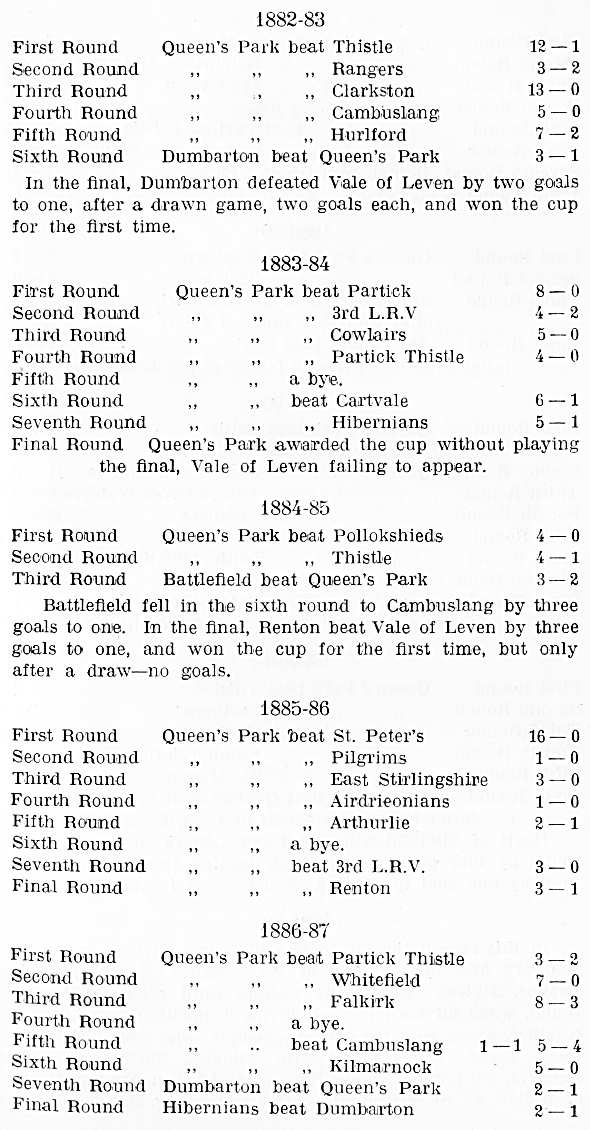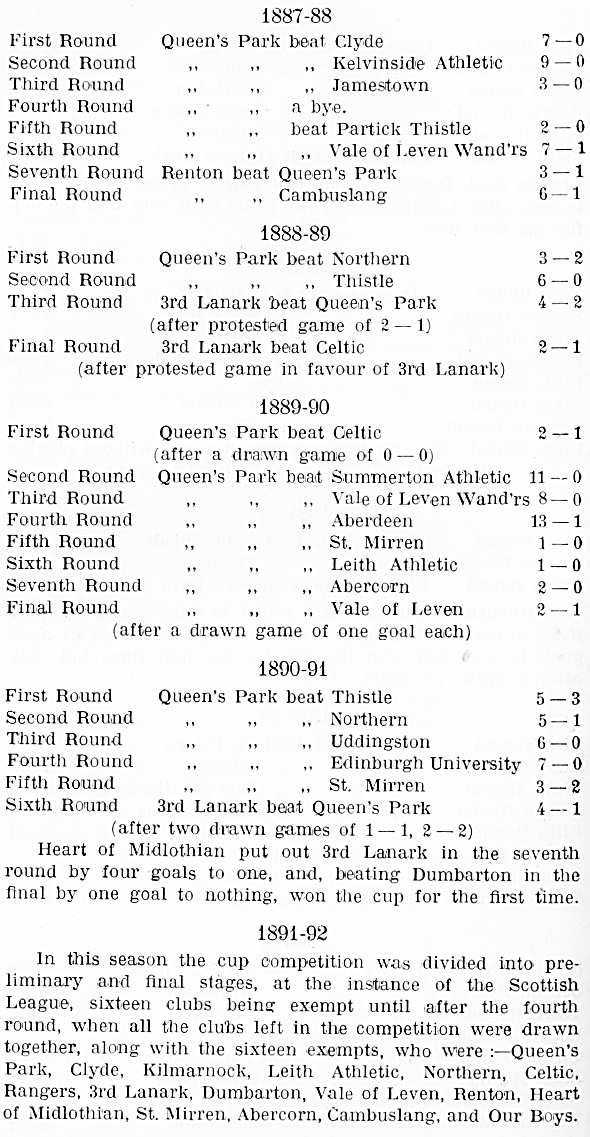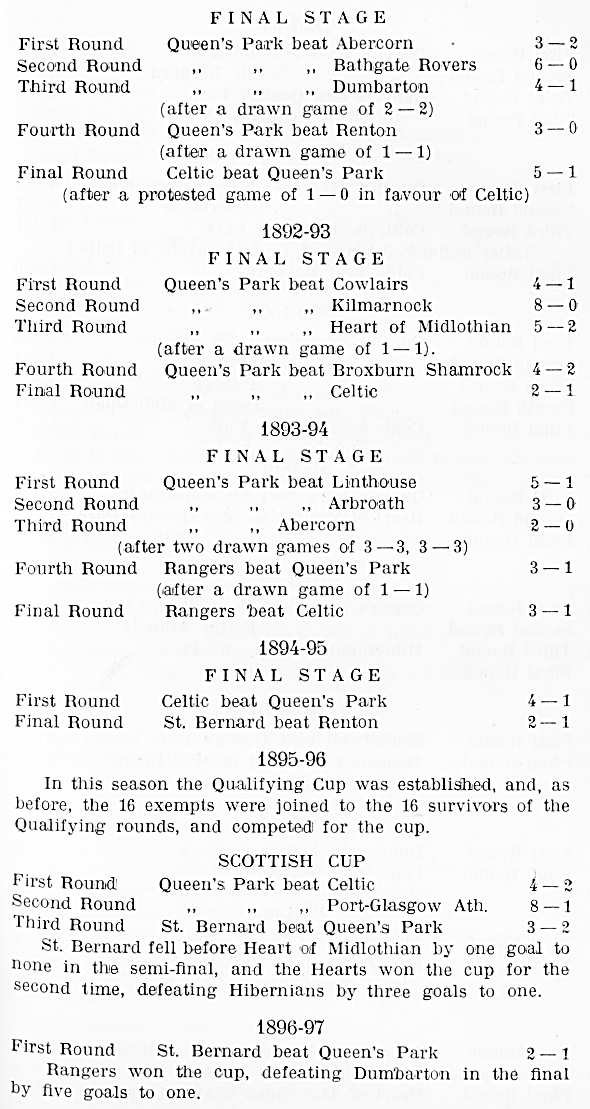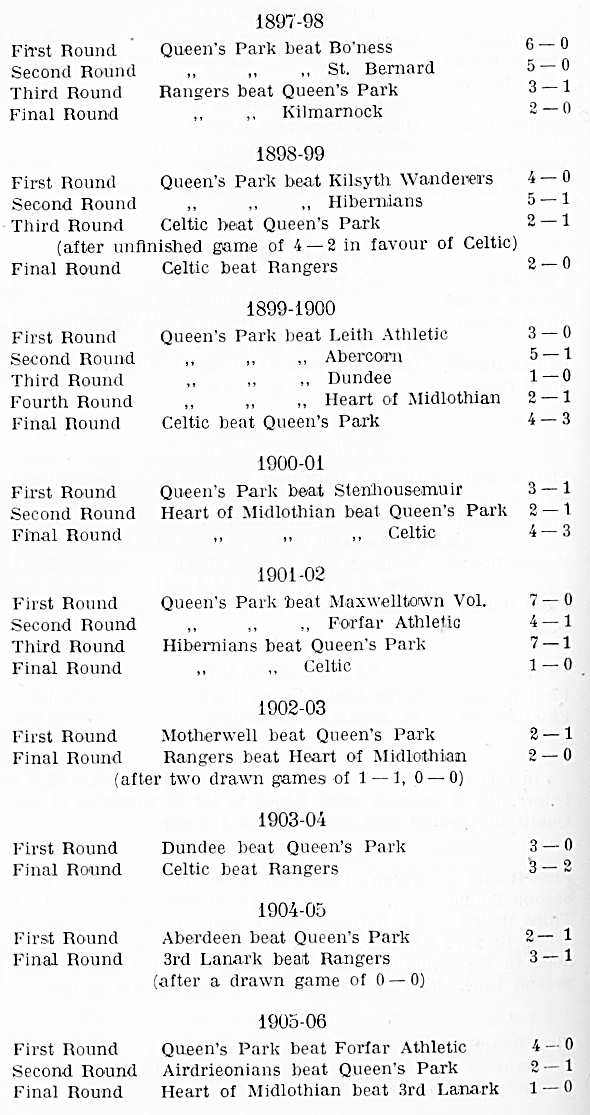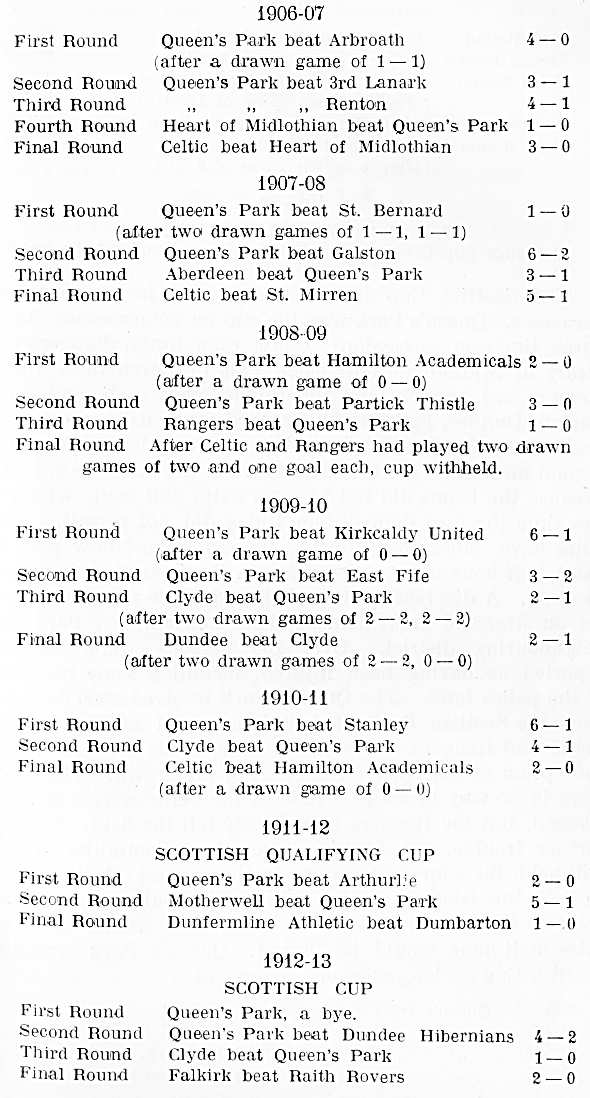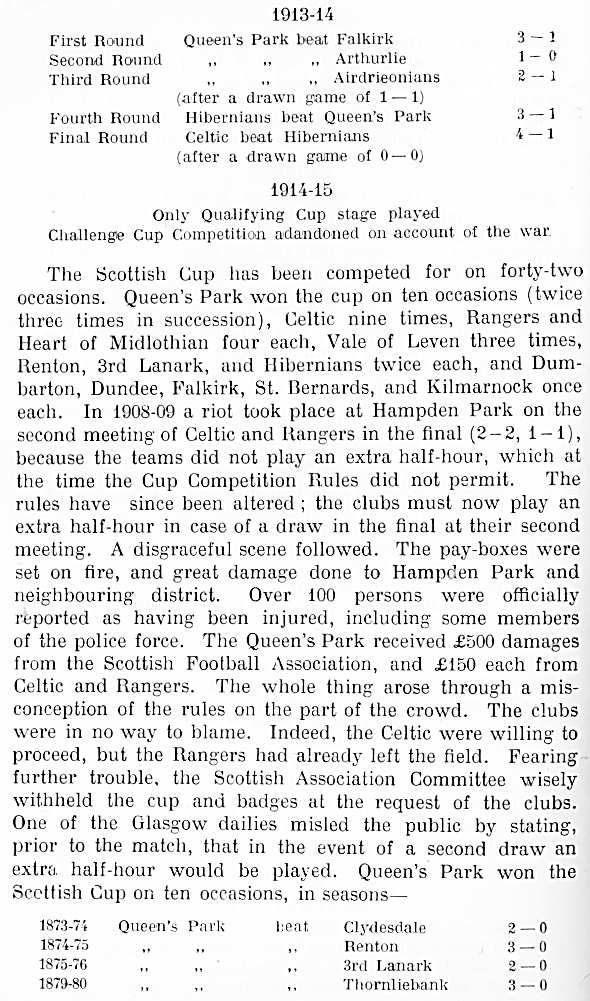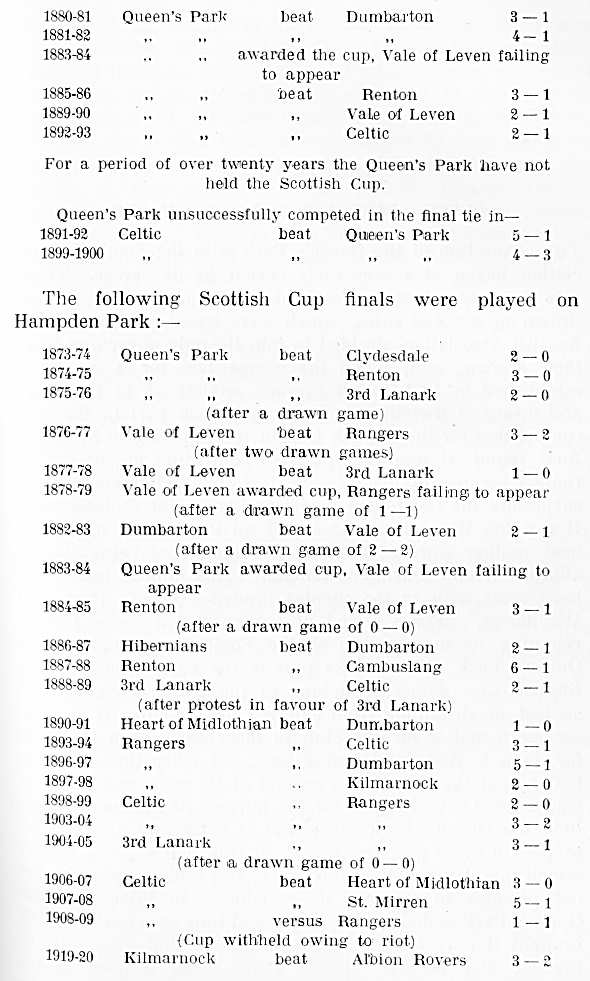It is natural to suppose that the Queen's Park, having
taken such a deep interest in the foundation of the Scottish Football
Association, and subscribed £5 towards procuring a cup to be competed for by
Scottish clubs only, should put forth its best energies to win that cup in
the first year of the Association and of the competition. The idea of
instituting both was its own, borrowed from the Football Association, which,
while eight years in existence, had only the preceding season, 1871-72
decided to have a cup competition. For this cup also, Queen's Park was one
of the first competitors. Football was at the time in its extreme infancy,
so far as the Northern Kingdom was concerned, and the Queen's Park club the
guiding and controlling spirit of the game in Scotland. On looking over the
list of clubs—sixteen in number—which took part in this first competition
for the Scottish Gup, we find practically the names of all the clubs then in
Scotland, with the exception of Rangers. The new game had its genesis in the
West, and there also was Association football practised. The names of the
sixteen clubs are: Queen's Park, Vale of Leven, Dumbarton, Renton,
Kilmarnock, Eastern, Rovers, Blythswood, Western, Alexandria Athletic,
Callander, Clydesdale, Granville, Dumbreck, 3rd Lanark, and Southern. Though
the Rangers, consisting of a number of Garelochhead youths, had been banded
into a club, and played on the Green in 1872, it was late in entering for
the cup that first season. Hamilton Gymnasium, Airdrie, and Thistle, each
opponents of Queen's Park, are also absent. The Queen's Park had to meet
Dumbreck in the first round, and this tie was the first game played on first
Hampden Park, and in it were worn, also for the first time, the famous black
and white colours, which superseded the blue jersey of the preceding season.
It was only to be expected that Queen's Park, who had "never lost a goal nor
even a touch down"
in club matches, should win the cup on this occasion,
defeating in turn Dumbreck, 7-0; Eastern, 1-0; Renton, 2-0; and Clydesdale,
in the final, 2-0. Clydesdale had had a considerable accession of strength
by the defection of R. Gardner, the great goalkeeper ; the brothers
Wotherspoon, in the early part of 1874; and before this Fred. Anderson, and
these desertions told a tale, when the Queen's Park and Clydesdale became
again opponents in the fourth round of the cup competition of 1874 75. It
took no fewer than three games before the Titwood combination was shaken
off, the scores in the three ties being 0-0, 2-2, and 1-0. The Queen's Park
gained the final from Renton by 3-0. Twenty-five clubs participated in the
competition of that season, and forty-nine in that of 1875-76; therefore it
is clear the Scottish Association had come to stay. It increased in numbers
rapidly by the accession of clubs, and the Association itself grew in
authority and usefulness. It now becomes evident from the narrowness of the
majorities obtained by the Queen's Park in the ties of the second and third
seasons of the competition, and also in ordinary games, that other clubs
were prepared to contest its supremacy. Somehow Clydesdale and Queen's Park
seemed fated to meet each season, and no love was lost between them. In the
third round of the 1875-76 competition, Queen's Park put out Clydesdale by
2-0, after a stubborn fight. Dumbreck, beaten in the fourth by similar
figures, did much better than in the first tie for the cup on Hampden in
1873. Vale of Leven, in the fifth round, stole the first goal Queen's Park
had ever lost. For the third consecutive time the Queen's Park won the cup,
defeating 3rd Lanark in the final by 2-0. Season 1876-77 was a fatal year
for the Queen's Park, hitherto invincible at home. In it the club had to
admit, for the first time, the supremacy of a home club—harder to bear
probably than the English reverse by Wanderers in the previous season— Vale
of Leven, an old and determined opponent since the days of the Recreation
Ground, ousting Queen's Park from the cup competition in the fifth or
semi-final round by 2-1. It was an unpleasant episode, especially in its
after-results. This was the famous "crows' feet" game, as the Vale
characterised the spike marks which the Queen's Park alleged it discovered
on Hampden Park on the Tuesday after the tie, the epistolatory controversy
over which led to the estrangement of the clubs for a couple of seasons.
Vale of Leven won the cup that season for the first time, defeating Rangers
by 3-2. In the following season, 1877-78, Queen's Park did not travel
further than the third round, and even in that limited journey came up
against Clydesdale in the second, the Titwood club succumbing by 2-0. 3rd
Lanark had ample satisfaction in the third round for their overthrow in the
final of two years before, as they disposed of Queen's Park by 1-0, and fell
again in the final, Vale of Leven winning the cup on the second consecutive
occasion by 1-0. Pre-eminence for the Queen's Park could, at this stage, no
longer be claimed. Many other clubs had now reached the same level, and had
obtained confidence in themselves. Not that the "premier club" had in any
way deteriorated. The old science of the team was there, but it had now
become an asset common to all clubs who possessed the skill, enthusiasm, and
determination. Much of this levelling up was unquestionably due to the
Scottish Cup competition. The issue at stake is greater than in club
matches, the nervous tension often extreme; and some clubs excel others as
cup-tie fighters, where coolness and confidence are two valuable assets in
such games. The football enthusiast will rarely miss a cup tie, while his
attendance at any ordinary match depends very much on the excitement he
anticipates from it. The further a club progresses in the cup competition,
the greater is its cash balance, and that is another important con- |
sideration associated with such matches. While Queen's Park, each season,
made substantial progress in the cup competition, it was baulked in its
ambition, often at the eleventh hour. For instance, in 1878-79 it made a
triumphal progress through the first five rounds (in the third it had a
bye), and obtained twenty-four goals and lost none. Then it came up against
Rangers, a tough and exciting battle going to the "Light Blues" by 1-0. In
the final Rangers, dissatisfied with the decision of the umpires and referee
in disallowing a second goal claimed by them—a claim disallowed also by the
Association committee—refused to turn out again to meet Vale of Leven at
Hampden Park, and the Vale were awarded the cup. In the competition of
1879-80 Queen's Park won the cup for the fourth time, defeating Thornliebank
on Cathkin Park in the final by 3-0; all final ties had hitherto been
decided on old Hampden. In the competition of that season the club gained
fifty-three goals and lost five. In the very first round Rangers, the
conquerors of the previous season, received a nasty knock from Queen's Park,
who were the victors by 5-1. Dumbarton gave a lot of trouble in the
semi-final, Queen's Park winning by 1-0. Both the finalists of 1880-81,
Queen's Park and Dumbarton, had to face little opposition in the preliminary
rounds. Queen's Park had really nothing to stop its way, yet had to win the
final twice —both games were played on Kinning Park—as Dumbarton, defeated
by 2-1, successfully protested on the ground of encroachment by the
spectators. The committee were so incensed over the decision of the Scottish
Association in the matter of the protest against Dumbarton that it was
seriously considered, and actually moved by Mr. Thomas Lawrie at the annual
general meeting in 1881, "That this meeting remit full power to the new
committee, to withdraw from the competition for the Scottish Association
football cup during next season, should they deem it judicious," in a very
able and telling speech, in which he reviewed both sides of the question.
Mr. C. Campbell, always ready to throw oil on troubled waters, carried an
amendment by a large majority, "That the club remain in the cup ties." At
this same meeting a sharp discussion arose over the words, " blundering and
plundering,' used by the match secretary (Mr. A. Geake) in his report,
wherein he referred to the action of the Scottish Football Association
regarding the final tie with Dumbarton. The words were taken objection to by
some members, who wished them deleted. Mr. Morton moved as an amendment "
That the report be adopted in its entirety," which was carried by a large
majority. The club felt very strongly over this matter. A statement appeared
in the " Glasgow News," 5th December, 1881, to the effect that Dumbarton and
Queen's Park would play no club match next season, and Mr. Geake was
authorised to contradict this statement in a letter to the "Glasgow News,"
which contradiction appeared on 12th December. However, in September, 1882,
when Mr. A. M'A. Kennedy, secretary of the Dumbarton club, wrote regarding
matches, "after due consideration of the same, the committee decided that
the Queen's Park honorary secretary should write Mr. Kennedy, stating their
regret, that our respective match secretaries were unable to arrange
fixtures for the ensuing season." There is a great difference between
lability to arrange a fixture, and actual refusal. Thus was a breach opened
which lasted two seasons, the story of which is told elsewhere. This was the
fifth occasion the Queen's Park had won the cup, and a second series of
three consecutive wins had to be recorded, as in both 1881-82, on Cathkin
Park, the senior club was again successful in annexing the cup. Dumbarton
was again the opponent. At this period the team that represented the Queen's
Park was one of the best, if not the best, that had ever appeared on a
football field. Certainly it helped much to uphold the honour of the black
and white, and at a strenuous time accomplished many brave deeds. In 1881-82
the team scored sixty goals and lost six before the cup came into its
possession, and had to meet Dumbarton twice—2 - 2 and 4 -1—before the county
team succumbed. Dumbarton was a power in the land in those days, yet
somehow, when it came to the final tie, luck deserted it, and only once in
its history has it been able to have its name inscribed on the Scottish Cup,
though it has fought out five final ties. In 1882-83 the only serious
opponent Queen's Park had in the early ties was Rangers, who went out by
3-2, in the second round. Meeting Dumbarton again in the semi-final, the
senior club went under by 3-1. After two games—2-2 and 2-1—Dumbarton won the
cup for the first and only time in its history, Vale of Leven furnishing the
opposition. The game was played on old Hampden Park.
The course of events went on smoothly for a few years
between Vale of Leven and Queen's Park after the friction between the clubs,
when another difficulty arose over the final tie for the Scottish Cup, which
was to be decided at Cathkin Park, 23rd February, 1884. The clubs, however,
were not at variance on any question, as it was a matter entirely between
the Scottish Association and the Vale. The latter having team troubles, and
not prepared to their satisfaction to play this important match against such
a foe as the Queen's Park, applied to the Scottish Football Association for
a post ponement, which was refused. Consequently the Vale took the
management of affairs into their own hands, defied the Association, and
declined to play on the date fixed. The Vale had some justification for not
turning up to play this final on 23rd February, 1884, though their reasons
could not be accepted as a general practice, else the Scottish Association
would never get through the cup competition were clubs to play only when
they considered they were fully represented. The Vale alleged their best
players were on the injured list, and consequently the team could not turn
out in full force. Forbes, their great back, certainly was, and three other
members of the team were among the sick and injured. The Association justly
refused their application for a postponement, and it was only after this
refusal that the Vale communicated officially with the Queen's Park, and
informed the club they would not play the tie on Saturday, and no reason
whatever was given for taking this step. This was scarcely courteous. The
Vale never requested the Queen's Park to oblige by putting back the tie. The
Queen's Park came on Cathkin Park, with the umpires and referee appointed by
the Association, and when the Vale did not put in an appearance the referee
intimated that, so far as he was concerned, the match was theirs. 3rd Lanark
filled the bill that afternoon, and lost by 4-0. At a special meeting of the
Queen's Park on 26th February, 1884, Mr. Geake was instructed to write to
the Association, claiming the tie and the cup. Some of the committee looked
at the money aspect of the question, but sordid feelings of this kind never
influenced the club, who were above considerations of gate-money. The,
Queen's Park was awarded the cup by the Business Committee of the
Association, and accepted it. There was an hour's debate at the meeting of
the General Committee of the Scottish Football Association over the adoption
of the minutes of the Business Committee, who had ordered the tie to go on.
Mr. J. W. Mackay at length moved their adoption, Mr. R. Robinson seconding.
An amendment, moved by Mr. Sutherland, seconded by Mr. A. Campbell
(Dumbarton), to reject the minutes was defeated by seven votes to six—a very
narrow majority, but sufficient. The Queen's Park, however, did not shirk
the issue, and were quite willing, indeed anxious, to play the Vale of Leven.
Mr. Thomas Lawrie, 4th March, 1884, moved at the Queen's Park committee
meeting, "That in view of the unusual and in a sense unsatisfactory
termination of the contest, that the match secretary be instructed to
communicate with the Vale of Leven club, offering to play them an
independent match, and expressing their willingness, with the permission of
the Vale, to devote the proceeds to public charities," which was carried. As
events had developed unpleasantly, the match committee thought it right to
take up a more dignified attitude, and allowed the matter to drop, which did
not quite please the major committee, who discussed adversely the action of
the match committee fa not first consulting them before declining to carry
out the instructions given them. Mr. Campbell thought the match committee
had acted wisely, while Mr. R. Browne was of opinion the ruling of the
committee should not have been departed from. These expressions of opinion
ended the matter. It seems strange that Vale of Leven, in thus acting, had
not profited by the fate of the Rangers in the Scottish final of 1878-79,
which club, after playing a drawn game of one goal each with Vale of Leven,
refused to meet the Vale again as ordered by the Scottish Committee, and
Vale of Leven were awarded the cup. The Association Committee unanimously
sustained this decision, resolving "That on account of the Rangers club
having refused, and failed, to play the Vale of Leven, in accordance with
the instructions of the committee of the Association, the cup be awarded to
the Vale of Leven club." This precedent was disregarded by the Vale.
Battlefield now engross attention in the Scottish Cup
competition, as in the competition of 1884-85, in a most sensational tie in
the third round, that club defeated Queen's Park on Hampden Park by 3-2. The
wholly unexpected had happened. It was scarcely possible, and many people
were incredulous, when rumour reached the city that the Queen's Park had
been ejected from the ties by these mere youths. Battlefield, however, had
suffered few defeats that season, and their success was no fluke. Here for
the first time Queen's Park decided to enter a protest against certain
members of the Battlefield not being properly registered with the Scottish
Association. There were irregularities in this respect, but the Association
Committee did not consider them of sufficient importance to warrant the
upsetting' of the result, so they dismissed the protest. Members of the
Battlefield immediately after this victory gave substantial help to the
Queen's Park when in stress for players, and in subsequent years became, as
members of the Queen's Park, prominent players, one especially, William
Sellar, filling the office of president of the club for three years.
Battlefield reached the semi-final in this season, falling unexpectedly to
Cambuslang by 3-1. Renton, another Dumbartonshire club, secured the. cup for
the first time, beating Vale of Leven by 3-1 on Hampden Park. Any
disappointment the Queen's Park may have met with that season, and it
certainly was a bitter experience, was compensated for in season 1885-86,
when luck attended the club in the drawings for the preliminary rounds. Not
until the semi-final was any serious work necessary. Then 3rd
Lanark were encountered, and worsted by 3-0. This was the famous snow
semi-final, played 16th January, 1886. Snow and sleet came down from the
regions above with steady persistency, and a high and piercingly cold wind
swept over Cathkin Park. Conditions could not have been worse. Had the clubs
acted with common sense, the tie should have been put off, and trust put in
the wisdom of the Scottish Football Association to sanction their action.
After ten minutes' play the teams held a consultation re adjournment,
the Volunteers being already benumbed, and having now to face the storm. The
crowd, however, began to demonstrate, and the game went on to half-time, the
Queen's Park then standing 3-0 up, Christie scoring the first, and
Somerville the other two. All were pinched with the extreme cold, and half
frozen. When the teams reached the pavilion— Gillespie getting there under
the shade of a friendly umbrella —proposal was made to stop the game, but
while J. J. Gow, who captained the Queen's Park, was himself willing to
stop, his team wanted the thing finished, as the Corinthians had to be
played in London on the following Saturday. The "Third'' were unanimous to a
man for stopping, as three of their team were benumbed with cold, and
Thomson had to be given restoratives to get up the circulation. The Queen's
Park, with three goals ahead, held out. The Volunteers wanted Mr. Aitken, of
Johnstone, the referee, to rule, the weather conditions precluded further
play. That gentleman had no objection, provided both clubs could agree on
the point, not otherwise. Eight members of 3rd Lanark were willing to turn
out. Ultimately the club lodged a protest against the weather, and declined
to play further. The Queen's Park team went on the field, kicked the ball
through the goal, and the referee had no alternative but to award the tie to
Queen's Park—a decision subsequently confirmed by the Association. This
termination was unfortunate, and tested the patience of a drenched and
frozen crowd, who hooted their indignation outside the pavilion. There were
no hot baths in club-houses in those days, and the cruel experience of both
teams might have had serious consequences to themselves from a health point
of view.
Renton, the holders, did not fare much better in the
final than the Volunteers, as Queen's Park had a 3-1 victory. A great game
it was, witnessed by 10,000, on a wet and disagreeable afternoon, at Cathkin
Park, 13th February, 1886. Little incidents connected with the game were
freely criticised after it was all over. Renton claimed that the second goal
taken by Queen's Park was off-side. Hamilton centered the ball, Christie
played it, and Harrower, who was in front of Christie, put it through. Were
there three Renton men between Harrower and the goal?—a point over which
there was great difference of opinion. The Queen's Park said "Yes." Renton,
as strongly, "No." The officials also said " Yes." The Queen's Park, on the
other hand, maintained the first goal scored by Renton should not have been
allowed, as Kelso sent the ball through from a free kick without touching a
player on either side. Opinions again differed, but the officials sided with
Renton. A third matter in dispute was that Renton had been allowed a corner
kick, after an exciting maul, out of which Gillespie crept over the line.
The officials gave a kick from goal. However, the result of the game would
not have been affected, even had the Queen's Park not been allowed their
second goal, as there was no doubt about the other two. The Queen's Park now
had its name again on the cup, only to lose the trophy in 1886-87, Dumbarton
turning up trumps in the semi-final, after a hard game, by 2-1. Hibernians
were the ultimate winners, making their debut as cupholders, Dumbarton
succumbing in the final, also by 2-1, on Hampden Park. Another run, in
1887-88, by the Queen's Park to the fatal semi-final was checked at this
stage by Renton, who not only disposed of the premier club in that round by
3-1, but also won the much-coveted trophy from Cambuslang, on Hampden, by
6-1. In 1888-89 3rd Lanark appear as Scottish Cup holders for the first
time. The Volunteers had a substantial victory over Queen's Park in the
third round by 4-2, after a protested game of 2-1. Celtic, formed in 1888,
were defeated by the Volunteers in the final by 2-1, at Hampden, after
another protested game —not bad for a first essay. This was the famous
"snow" final. The clubs decided to play a friendly match without the
authority of the referee, the Volunteers winning by 3-0. A protest followed,
and the game was replayed. When Queen's Park secured the cup for the ninth
time, in season 1889-90, it had by no means an easy passage through the
ties. In the first round, Celtic, then in its second year of usefulness,
stood up manfully to the seniors, though, so far as playing experience is
concerned, the Celts were quite the matured article, having gathered
together the best players of older clubs, and produced a team of all the
talents, which became at once a force in Scottish football. This force had
reached the final the previous year, and now was prepared to contest the
opening round with Queen's Park. A stiff and determined struggle it proved,
and the survivor did not press into the next round until two games had been
played, neither scoring in the first, and Queen's Park winning the second
game by the narrow majority of 2-1. The Queen's Park obtained thirty-two
goals and lost one in the following three rounds. Then St. Mirren proved the
stiff obstacle-won by only 1-0. Leith Athletic came next—gained 1 - 0; and
then Abercorn, who lost by only 2-1. The final lay between the old firms,
Queen's Park and Vale of Leven, who met at Ibrox Park, and the games—there
had to be two played before a decision was obtained—were worthy the
occasion, and the clubs. After a draw of 1-1, Queen's Park got through by
2-1. Pretty hard fighting this, but no club was exempt from similar
experiences in the Scottish ties. Thus, in season 1890-91, Queen's Park and
3rd Lanark had to meet thrice—1-1, 2-2, 4-1—in the sixth round before the
Volunteers passed through, to meet, and be beaten by, Heart of Midlothian in
the semi-final by 4-1, the Hearts gaining the custody of the cup for the
first time by overthrowing Dumbarton in the final, at Hampden, by 1-0.
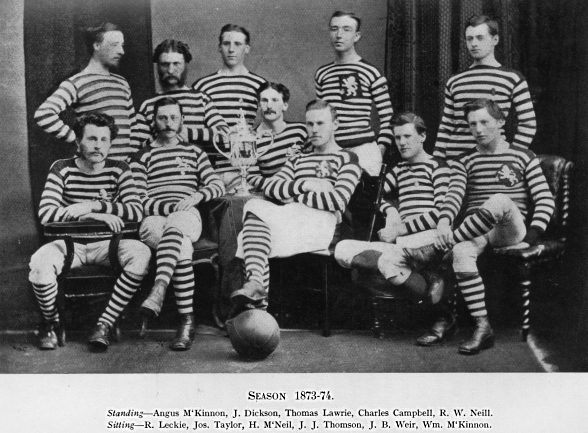
In 1891-92 the Scottish Association divided the cup
competition into preliminary and final stages, and exempted sixteen of the
principal clubs, including Queen's Park, from the preliminary ties. Our Boys
declined the honour of exemption. The sixteen survivors of the preliminary
were drawn, along with the sixteen exempts, and formed the final stage of
the competition. In the third round of this final stage Dumbarton disputed
the right of the Queen's Park to proceed further, and so determinedly that
the first game was drawn (2-2), and the second won by the Queen's Park
(4-1). Renton took up where Dumbarton left off, with the same experience, a
draw (1-1) and a victory for Queen's Park by 3-0. In the final, Celtic and
Queen's Park were dissatisfied with the conditions at Ibrox Park, though the
Celts were in the majority of 1-0 at its finish, and both clubs lodged
protests with the Association, who granted their Petitions, and fixed the
replay for 9th April, 1892, when Celtic at last secured the cup, after
several disappointments, by the respectable majority of 5-1. The grave
question of professionalism had engrossed the attention of the Scottish
Football Association for several years, and its efforts to check the evil
had failed. The Football Association long before had taken the professional
clubs to its bosom, in their own interests, and the Scottish Association,
seeing the ranks of clubs under its jurisdiction depleted, was forced to
legislate for. and recognise professionalism in 1893. The Scottish League
had its birth in season 1890-91, and Queen's Park were left outside this
bund. The issue before the Queen's Park became now a most serious one. It
decided, without hesitation, not to abandon its ideals, and would stand or
fall under the amateur banner. It was a determination which might have meant
the absolute ruin of the club, yet for ten whole years it stood outside the
League, until 1900-01, when it decided to join that body in the hope of
better fortunes, holding fast, however, to its amateur principles. Under
these circumstances, it is not surprising that the following season saw its
tenth, and last cup victory, when it wrested the laurels from Celtic, the
chief apostle of the League system, at Ibrox, by 2-1. Queen's Park has only
once since appeared in a Scottish final, and that was in 1899-1900, when
Celtic were the victors, at Ibrox, by 4-3. In the interval between 1893 and
1900, Queen's Park never got beyond the third round of the final stage, and
twice, in 1894-95 and 1896-97, fell respectively, in the first round, to
Celtic, 4-1, and to St. Bernards, 2-1, St. Bernards also defeating Queen's
Park, in the third round, 1895-96, by 3-2. Beaten by Heart of Midlothian,
2-1, in the second round, in 1900-01, it fell to Hibernians, 7-1, in the
third round, in 1901-02; to Motherwell, 2-1, first round, 1902-03; to
Dundee, 3-0, first round, 1903-04; Aberdeen, 2-1, first round, 1904-05;
Airdrieonians, 2-1, second round, 1905-06 ; got as far as the, fourth round
in 1906-07, beating Arbroath (after draw—1-1) 4-1, 3rd Lanark 3-1, and
Renton 4-1, respectively, in the three preceding ties, Heart of Midlothian
finally stopping its way by 1-0. In 1907-08, St. Bernards had the better of
Queen's Park in the first round, after three games had been played—1-1, 1-1,
1-0. In 1908-09, Rangers disposed of Queen's Park in the third round, 1-0.
This was the year in which a serious riot took place. A disorderly crowd,
disappointed that Celtic and Rangers did not play an extra half;, hour after
a second drawn game, wrecked Hampden Park. In 1909-10, Clyde settled the
chances of the Queen's Park in the third round, after three meetings—2-2,
2-2, 2-1; and in 1910-11, Clyde, in the second round, beat Queen's Park,
4-1. It is a rather undignified position to find Queen's Park relegated to
the Qualifying stage in season 1911-12. Not being one of the exempts, it was
forced to compete for the Qualifying Cup, and with very poor success, as in
the second round Motherwell put the amateurs out by 5-1. We find Queen's
Park back again in the final stage, and one of the exempts in season
1912-13, and, after a bye in the first round, it put out Dundee Hibernians
in the second, 4-2, only to submit to Clyde in the third, 1-0. The last
competition for the Scottish Cup proper, prior to the Armistice, took place
in 1913-14, when Queen's Park occupied a better position in the ties,
reaching the fourth round, in which Hibernians were the conquerors by 3-1.
Though the Qualifying Cup competition was carried through in 1914-15, the
Scottish Association decided not to proceed with the final stages for the
challenge cup, and no further competitions took place until 1919-20. Celtic
were the last winners of the Scottish Cup, which lay in commission during
the war. As in the Scottish Cup competition, so in the Scottish League
competition, the Queen's Park just failed to win its games. Its defeats were
never by large majorities. It did not exactly win, as was to be expected,
where pure and unadulterated amateurs compete with professionals—men who
devote all their spare time to training, are paid high wages, and are under
a severe discipline. The Queen's Park holds the championship for drawn games
in the League, and as a drawing power at the gates the club is an invaluable
asset. The great bulk of the public sympathise with it, are proud of its
stand for amateurism, understand its difficulties, and when it meets with
success, are lavish in its praise. This was fully demonstrated in the year
of grace 1918, when, blessed with a splendid team, it met with great
success, winding up a most satisfactory season with a total of thirty-four
points, or one point per match, and occupying seventh place on the League
table. Further, for the first time since it joined the League in 1900-01, it
had a majority of goals, even though it is only a bare majority—sixty-four
goals won and sixty-three lost. Opponents will say its success is due to the
fact that the best professional players had gone to the war. So have the
best amateur players, and no Scottish club has suffered more in this respect
than the Queen's Park, whose Roll of Honour speaks for itself. The club had
to disband its Victoria and Hampden Elevens during the war, and rely solely
on the Strollers and the schools for recruits. The club has done well, and
its managers deserve the congratulations of every lover of football on the
invaluable services rendered, as valuable in its way as those of the early
pioneers, who, in 18G7, founded the club, and introduced and fostered
Association football in Scotland.
The following is a list of the positions Queen's Park
occupied in the Scottish Gup ties since the commencement of the competition
:—
